{UAH} 'Praise the lord and pass the rattlesnakes': the pastor killed by the viper he preached with
'Praise the lord and pass the rattlesnakes': the pastor killed by the viper he preached with
Mack Wolford coiled venomous snakes round the arms and necks of his congregation. One, called Old Yeller, killed him. Photographer Lauren Pond relives how she captured the tragedy
Pastor Mack Wolford had many ways of getting the faithful all fired up. He would drive from town to town, preaching, singing, speaking in tongues and brandishing – on several occasions – venomous snakes. Wolford, who lived in McDowell County in West Virginia, belonged to the Full Gospel Apostolic House of the Lord Jesus, one of the few remaining small Appalachian Pentecostal sects known as "sign followers".
They adhere to a literal interpretation of a passage from the Gospel of Mark in the King James Bible. "And these signs," it says, "shall follow them that believe; In my name shall they cast out devils; they shall speak with new tongues; They shall take up serpents; and if they drink any deadly thing, it shall not hurt them; they shall lay hands on the sick, and they shall recover."
Lauren Pond began photographing Wolford and his congregation in 2011, overcoming her own fear as she shot rattlesnakes and copperheads being coiled around the arms and necks of worshippers as they reaffirmed their faith in the divine. On 23 May the following year, just before his 44th birthday, Wolford posted this message to his followers on Facebook: "Praise the lord and pass the rattlesnakes, brother."
Four days later, Pond followed him deep into the Appalachian hills. She shot several frames at an outdoor service as Wolford held, and then walked on, a timber rattlesnake called Old Yeller he had owned for several years. "Gone was the benevolent energy I had felt the previous year," Pond later wrote, "and in its place an odd sense of urgency."
As she shot, "suddenly an eerie stillness fell over the picnic site". The cause quickly became clear: Wolford had been bitten. Eight hours later, he died, his family and followers having respected his steadfast refusal to send for medical treatment until it was too late – so strong was their belief that his fate was solely in God's hands.
For Pond, who had become friends with Wolford, it was a deeply upsetting experience and one, you sense, she has not fully come to terms with. "I was only 26," she says, "and I was a bit overwhelmed. I felt powerless and helpless. I didn't know what to do, but my instinctive response was to pick up the camera again. In a way, the camera was my shield. I also knew he had been bitten before and I thought he would get better. Looking back, it did spin out of control for me."
Pond's new book, Test of Faith: Signs, Serpents, Salvation, chronicles her time among the sign followers. It includes images that track Wolford's agonising final hours as he is carried, semi-conscious and drenched in sweat, to a nearby chair by members of the congregation. He was then driven from the service to his mother-in-law's house, where he died. There are powerful images of him lying prone on a couch while his family pray around him.
"I went with them to the house, then left for a few hours so the family could have some space," says Pond. "When I returned, he was having trouble breathing. He declined very rapidly in the end, and people were devastated. No one expected him to die."
In the aftermath, ABC News reported that the park authorities had been unaware of the nature of the event and quoted a spokesperson saying: "If we had known about it, or if we had been asked for permission, permission would not have been granted."
Nevertheless snake-handling is still legal in West Virginia, if a fading tradition. Other Appalachian states, including Kentucky and Tennessee, have banned the practice in public spaces. Four years ago, Jamie Coots, a Kentucky pastor who hosted a reality TV show called Snake Salvation also died from a snakebite, having refused medical treatment.
For a long time afterwards, Pond, who is from California and had been welcomed with her camera into the small community by Wolford, was haunted by his death. "It didn't feel right for me to impose my values on theirs, but then you are left thinking, 'Would I do anything differently now?' The truth is, I still don't know. It was such a heightened atmosphere, such an unreal experience."
Her relationship with the family grew more fraught when some of her photographs were published in a newspaper soon after his death. In two, Wolford was shirtless. "They are such a modest community that it was akin to him being seen naked," she says. "They are people of the spirit, not the flesh."
Wolford's wife had asked her not to photograph him with his shirt off. So for her, it was even more of a betrayal. "Being an outsider, I didn't fully understand the sensitivity of the issue. I made a mistake," says Pond. "I had a responsibility to tell the story, but I should not have published those two photographs. It was a hard experience."
The book's title, Test of Faith, seems double-edged, referring to the risks Wolford took in his sermons and Pond's belief in the transformative power of photography. In the year following the death, Pond questioned her role as a documentary photographer, so much so that her style changed, becoming more detached. "I was afraid to get too close," she says. "I was shooting my subjects from a distance. I had to learn to get close all over again."
Pond was raised in a Presbyterian family "but never went to church". On her website, she describes herself as "specialising in faith and religion". She also works for Ohio State University, filming and recording religious communities. Has her experience made her more religious? "I think my upbringing instilled a curiosity in me that has perhaps become more defined of late. But I am not on any big religious quest. I enjoy connecting with people who are very different to the mainstream, to the point where they are seen as 'other'."
A year after Wolford's death, Pond attended his anniversary service at the invitation of his family. "It was a gesture of forgiveness on their part. I went and I talked to them about everything that had happened, all the confusion and misunderstanding. That started the mutual healing."
Wolford's own father actually died of a snakebite when he was a teenager and the family continue to handle snakes, with Wolford's brother Chris now leading the congregation at a new church. Over the past few years, Pond has travelled back to West Virginia to spend Thanksgiving with Wolford's family. They have even allowed her to take pictures of them.
"The photographing came back as the relationship was restored," she says. "My work has changed dramatically since then, though, probably as a result of this experience and the pain it caused. I've realised the value of listening and being present with those I photograph – rather than being an outsider."
Disclaimer:Everyone posting to this Forum bears the sole responsibility for any legal consequences of his or her postings, and hence statements and facts must be presented responsibly. Your continued membership signifies that you agree to this disclaimer and pledge to abide by our Rules and Guidelines.To unsubscribe from this group, send email to: ugandans-at-heart+unsubscribe@googlegroups.com


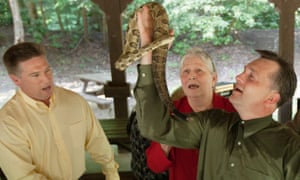
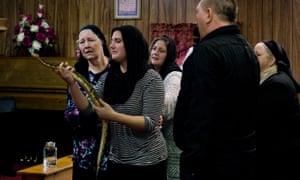
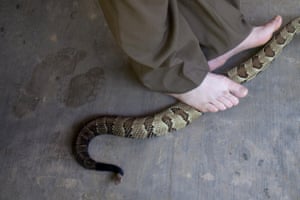
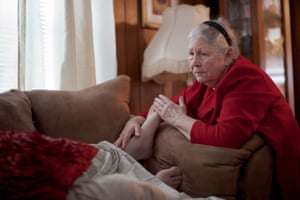
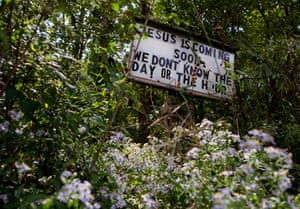
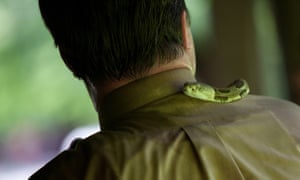





0 comments:
Post a Comment